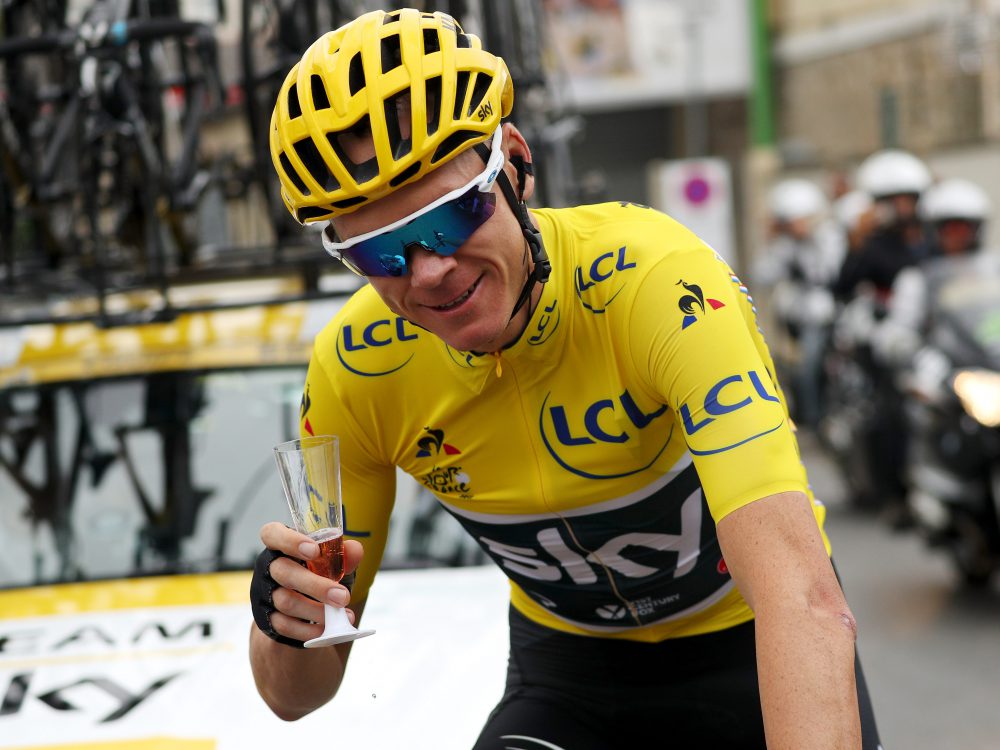Cycling’s grandest tradition: Chris Froome fails doping test, joins growing list of infamous champions

Admit it: You had a feeling it would happen. I had a feeling it would happen.
How could anyone not?
Chris Froome, the four-time Tour de France winner, confirmed Wednesday that he tested positive for excessively high amounts of the asthma drug salbutamol during the Vuelta a España in September, on his way to victory in that Grand Tour. The level of the drug found in his urine was twice the amount allowed by anti-doping rules.
This news comes as no surprise. Not necessarily because it was Froome, the 32-year-old rider for Britain’s Team Sky who has dominated cycling in recent years. But because the revelation fits right in with a Tour tradition.
So Froome’s name now goes on the growing list of cycling champions turned infamous for failed drug tests or doping admissions: Lance Armstrong. Floyd Landis. Jan Ullrich. Alberto Contador. And on and on.
The last time there were back-to-back Tours de France without the winner becoming entangled in a doping scandal was 1995, when Miguel Induráin of Spain won his fifth and final Tour. (Yet he, too, once failed a test for an asthma drug but was not punished.)
That’s an entire generation of embarrassment for a sport and its biggest stars. Three of those riders — Armstrong, Landis and Contador — have been stripped of some or all of their victories, but those falls from grace didn’t happen without a fight. And it looks as if Froome is preparing to dig in for one, too.
Froome, who has had asthma since childhood and has often used inhalers in public, may face a suspension of a year or more. But don’t think for a second that he and his powerful, often sanctimonious team are going to roll over and accept a ban.
Be prepared for explanations and excuses, and they had better be good, because cycling investigators have heard some doozies. Tyler Hamilton once blamed a doping positive on a vanishing twin in his mother’s womb. Landis once attributed a suspicious surge in testosterone on too many swigs of whiskey.
For the moment, Froome is free to continue racing, and he isn’t panicking. At least not publicly.
He told The Guardian and Le Monde that his asthma had worsened during the Vuelta, so he just followed a Team Sky doctor’s orders to increase the amount of salbutamol he was already taking. The drug opens airways — an undeniably helpful result in a sport like cycling — and some argue that if a handful of riders can take it for asthma, then every rider should be allowed to do the same. And why wouldn’t they? Salbutamol has been used to increase endurance, burn fat and increase lean muscle mass — basically the reasons the World Anti-Doping Agency affixed a limit to the amount an athlete could have in their system.
But even if a doctor told Froome to take more of the drug, Froome should have known better — he must know better — because that isn’t going to fly with anti-doping experts.
To be even clearer: If Froome’s version of events is true, he made a rookie mistake. It would also be a surprise if Froome couldn’t feel the difference between the regular amount of salbutamol he takes and twice that amount. And the consequences of getting caught doing so should have been obvious to an athlete who — as he admitted — knew he was going to be tested repeatedly.
So right now we know this: Something went very wrong for Froome at the Vuelta, and that something, now and perhaps forever, has put a black mark next to his name in every record book.
“I am confident that we will get to the bottom of this,” Froome wrote on his Twitter page. “Unfortunately I can’t share any more information than I already have.”
As you read this sentence, Dave Brailsford, Team Sky’s principal and founder, is becoming an expert on salbutamol, which is a twist. Over the years, he has talked a lot about drugs, but only about how none of his riders use them, and often — despite increasingly unexplainable incidents — with how-dare-you-insinuate-that-they-are-not-clean indignation.
In 2016, he brushed off the revelation by Russian hackers that the 2012 Tour winner, Bradley Wiggins, had gotten official clearance to use more than his fair share of otherwise restricted or barred drugs. That same year, he dealt with the fallout from the delivery of a mysterious medical package to Wiggins at the 2011 Critérium du Dauphiné, a critical Tour de France warm-up race.
Froome’s failed test could be different, though. Team Sky was founded in 2009 on the pompous premise that the organization had zero tolerance for performance-enhancing drug use and that it would fire anyone with a doping past. It was quite a bold and somewhat ridiculous idea, and the sideways glances only multiplied as Froome and Team Sky ascended mountain after mountain with improbable ease.
We’ll find out now if Team Sky’s stated zero tolerance applies to its best rider. If Froome can’t wiggle out of a suspension with an acceptable explanation, does it mean his time with Sky is over? My guess is it won’t — at least not if Brailsford can help it. After all, cycling’s rules are often broken or, at the very least, bent to fit the needs of a team or its star.
But if history has taught us anything, it is that the most dominant riders in cycling are the ones who fall the hardest.





